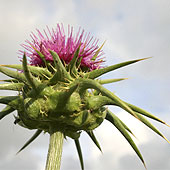Milk Thistle - Natural Health Product
Non-traditional solutions to help boost your health and wellness.
Milk Thistle
General Information
Milk thistle is a flowering herb that is native to the Mediterranean region. It has been used for thousands of years as a remedy for a variety of ailments, especially liver problems.
Milk thistle is sometimes called silymarin, which is actually a mixture of the herb’s active components, including silybinin (also called silibinin or silybin).
Common Name(s)
Scientific Name(s)

How is this product usually used?
Silymarin, which can be extracted from the seeds (fruit) of the milk thistle plant, is believed to be the biologically active part of the herb. The seeds are used to prepare capsules, extracts, and tinctures.
The recommended adult dose for milk thistle is 3 g to 14.5 g of dried fruit or seed per day, with no more than 4 g in a single dose. When the silymarin extract is known, the recommended adult dose is 140 mg to 600 mg of silymarin extract per day, with no more than 200 mg in a single dose.
It may take at least 3 weeks before seeing any benefits from milk thistle.
Your health care provider may have recommended this product for other conditions. Contact a health care provider if you have questions.
What is this product used for?
Milk thistle is believed to have protective effects on the liver and improve its function. It is also traditionally used to provide digestive relief. Other uses include:
- lowering cholesterol levels
- reducing insulin resistance in people with type 2 diabetes who also have cirrhosis
- reducing the growth of cancer cells in breast, cervical, and prostate cancers
- helping relieve digestive disturbances and dyspepsia
Your health care provider may have recommended this product for other conditions. Contact a health care provider if you have questions.
What else should I be aware of?
Currently, there is limited evidence to suggest that milk thistle is effective for any of its uses.
Reported side effects from milk thistle use include bloating, diarrhea, gas, nausea and upset stomach. However, they do not appear to be common.
Milk thistle can produce allergic reactions, which tend to be more common among people who are allergic to plants in the same family (for example, ragweed, chrysanthemum, marigold, and daisy).
Milk thistle may lower blood sugar levels. People who have diabetes or hypoglycemia, or who are taking drugs or supplements that affect blood sugar levels, should use caution.
Milk thistle may also affect estrogen levels. Before taking milk thistle, let your health care provider know if you have any hormone sensitive cancers or conditions, such as breast cancer, endometriosis, or uterine fibroids.
Milk thistle may interact with the following medications:
- ledipasvir
- morphine
- raloxifene
- sirolimus
- sofosbuvir
- tamoxifen
- warfarin
Consult your physician prior to using milk thistle if you are pregnant.
Before taking any new medications, including natural health products, speak to your physician, pharmacist, or other health care provider. Tell your health care provider about any natural health products you may be taking.
Source(s)
- Health Canada. Licensed Natural Health Products. Milk Thistle. https://webprod.hc-sc.gc.ca/nhpid-bdipsn/atReq.do?atid=milk.thistle.oral&lang=eng.
- Natural Medicines Comprehensive Database. Milk Thistle.
All material copyright MediResource Inc. 1996 – 2020. Terms and conditions of use. The contents herein are for informational purposes only. Always seek the advice of your physician or other qualified health provider with any questions you may have regarding a medical condition.


